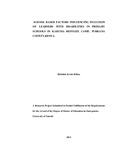| dc.description.abstract | The purpose of the study was to find out school-based factors influencing inclusion of
learners with disabilities in primary schools in Kakuma Refugee Camp, Turkana
County. The Study aimed at achieving the following specific objectives: To establish
the extent to which teachers’ attitudes influences inclusion of learners with disabilities
in primary schools in Kakuma Refugee Camp, to determine the extent to which
teacher’s training influences handling learners with disabilities in primary schools in
Kakuma Refugee Camp, to establish the extent to which attitudes of learners
influences inclusion of learners with disabilities in primary schools in Kakuma
Refugee Camp and to examine the extent to which infrastructural facilities available
influence inclusion of learners with disabilities in primary schools in Kakuma Refugee
Camp. The study adopted descriptive survey research design using both qualitative and
quantitative research paradigms. The target population for this study constituted 13
primary schools, 13 head teachers, 1950 class seven pupils in the 13 schools and 260
teachers from primary schools in Kakuma refugee camp and it had a sample size of 13
head teachers, 155 teachers and 320 learners. The Data Collection Instruments was a
questionnaire that is self-administered, interview schedule and observation list. The
data was analyzed using descriptive statistics namely Frequencies, percentages and
presented by use of tables. The study concludes Primary schools at Kakuma Refugee
camp are not conducive for learners with disabilities. This is contrary to (UNESCO)
view that regular schools with an inclusive setting are the most effective way to fight
against discriminatory attitudes in order to build an inclusive society and to achieve
education for all. Primary schools in the camp were not conducive for learners using
wheelchairs. This goes against the concept of special need education that inclusive
education described as a framework for action that would accommodate all children
regardless of their physical, intellectual, social, emotional, linguistic, or other
conditions. The school environment has not been designed to fit learners with
disabilities and Teachers do not appreciate inclusion of learners with disabilities.
Regular learners have positive attitude towards learners with disabilities. The study
concludes that teachers in mainstream school in the camp were not trained to handle
children with disabilities. The study recommends that Implementing Agencies of
Education in the camp in collaboration with UNHCR and the government of Kenya,
needs to provide teachers trained in special needs education at the camp and also
ensure that some incentive teachers from the refugee communities are trained on
inclusive education. For inclusive education to succeed in the Kakuma Refugee camp,
some modification ought to be done to the school environment to ensure that the needs
of disabled are catered for. The government of Kenya could also help in providing
some of the necessary support like training teachers in inclusive education,
sensitization also needs to be done so that learners and teachers and community at
large can change their views concerning people with disabilities and that the
government and the ministry of education should provide suitable infrastructure
necessary for all learners with disabilities. | en_US |

